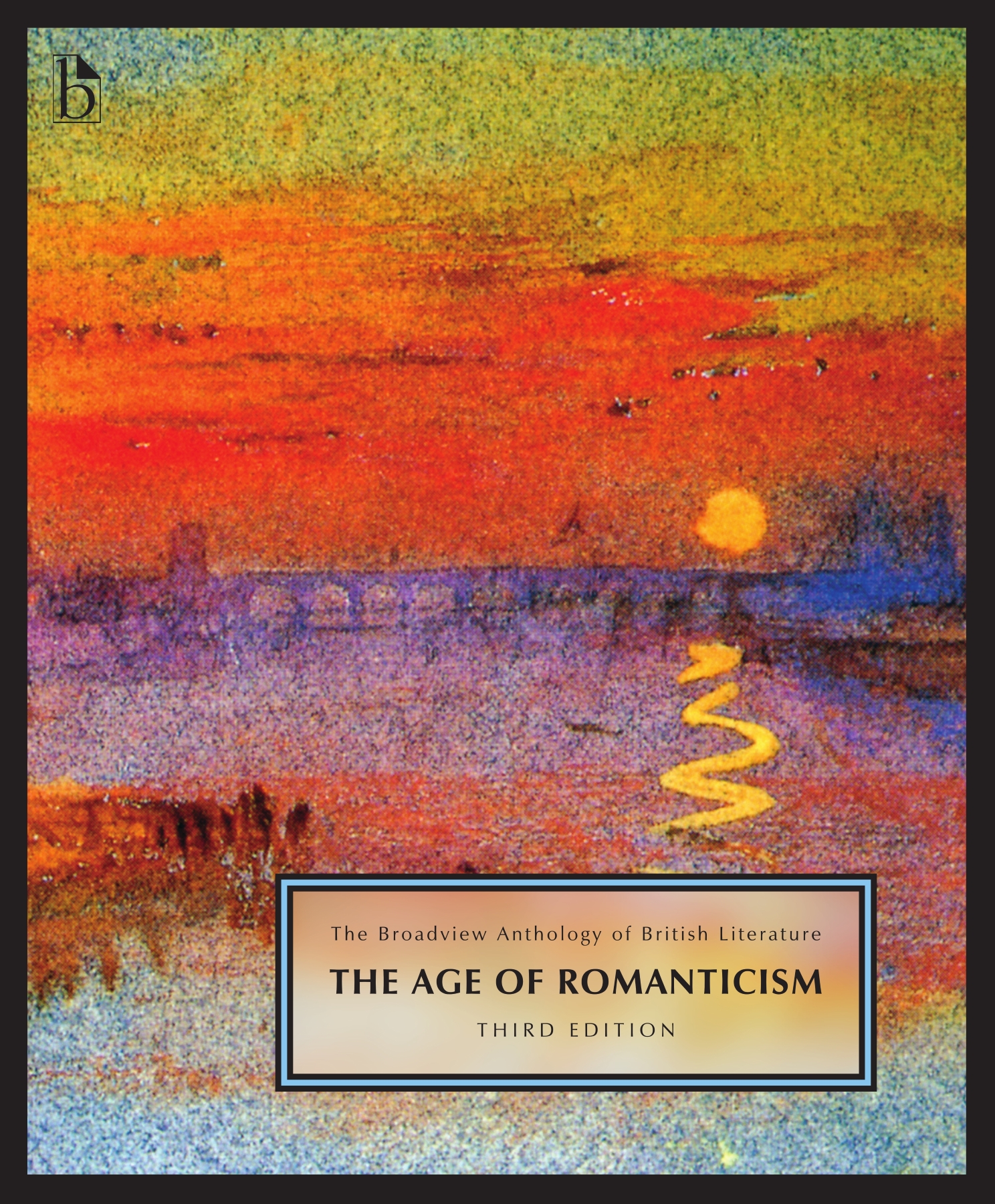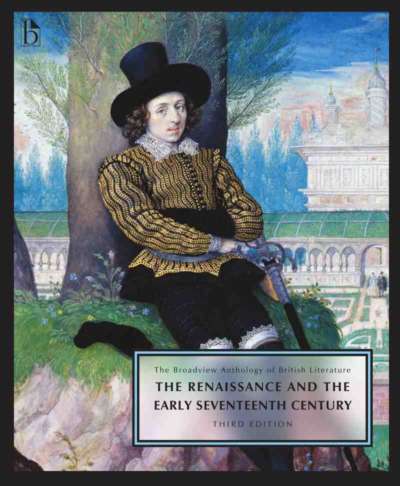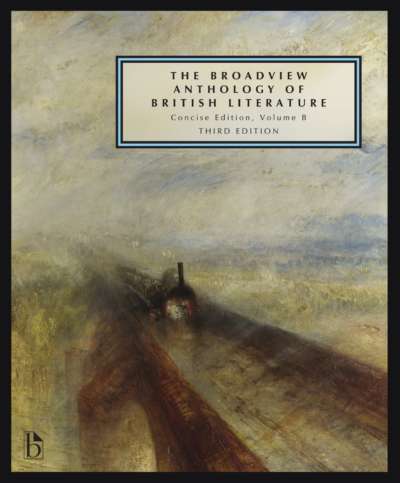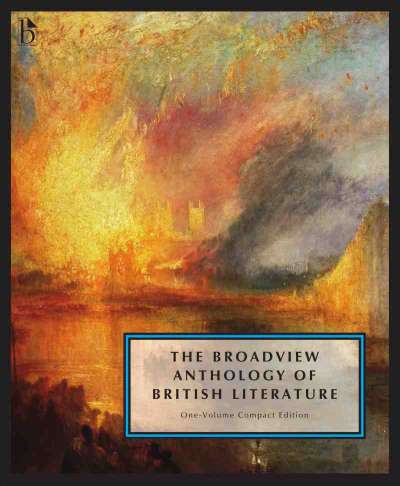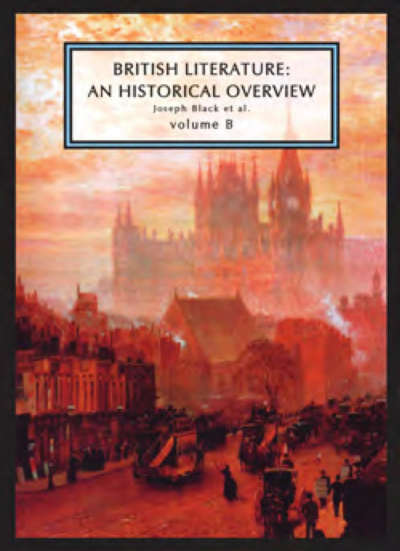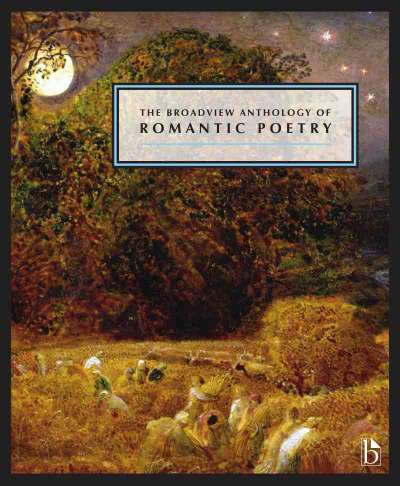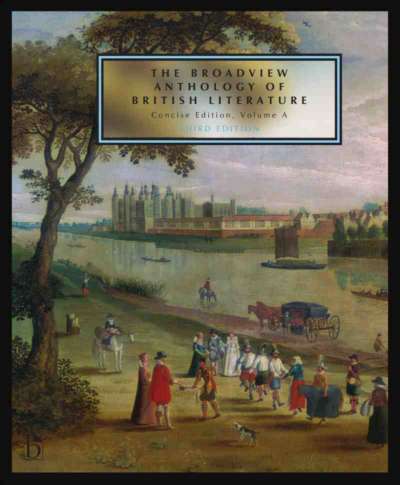In all six of its volumes The Broadview Anthology of British Literature presents British literature in a truly distinctive light. Fully grounded in sound literary and historical scholarship, the anthology takes a fresh approach to many canonical authors, and includes a wide selection of work by lesser-known writers. The anthology also provides wide-ranging coverage of the worldwide connections of British literature, and it pays attention throughout to matters such as race, gender, class, and sexual orientation. The full anthology comprises six bound volumes, together with an extensive website component; the latter is accessible by using the passcode obtained with the purchase of one or more of the bound volumes.
Volume 4: The Age of Romanticism offers expansive representation of the era’s poets from Samuel Taylor Coleridge, John Keats, and William Wordsworth to Anna Laetitia Barbauld, James Macpherson, and John Clare. The volume also features a broad sampling of important longer works including Songs of Innocence and of Experience, Castle Rackrent, Lady Susan, The History of Mary Prince, The Giaour, and Hyperion: A Fragment. Key currents in the literature and culture of the period are highlighted in “Contexts” sections addressing such topics as “The French Revolution,” “Gothic Literature,” “Reading, Writing, Publishing,” “The Natural and the Sublime,” and “Slavery and Its Abolition.”
A two-volume Concise Edition and a one-volume Compact Edition are also available.
Comments
“Since the publication of the first edition in 2006, the Broadview Age of Romanticism has outstripped all competitors in its cultural richness and array of conceptual offerings. This new third edition extends the lead in that area, with exciting new entries and course-ready units that help reframe key topics. … The Broadview provides great access to texts (thanks for The Giaour and Castle Rackrent!), but more than that, it is the kind of anthology that may shape innovative and necessary new thinking about the role played by Romantic literary, cultural, and material production at the onset of our contemporary world moment.” — Eric Lindstrom, University of Vermont
“I love the changes to the third edition! Adding excerpts from Macpherson’s Poems of Ossian allows students to engage with one of the least accessible but most immediately influential texts of the Romantic era; likewise, adding Byron’s The Giaour gives students a clearer sense of how the most charismatic Romantic poet established his reputation for dashing, exotic glamor.” — Evan Gottlieb, Oregon State University
“The new Broadview Anthology of British Literature: The Age of Romanticism includes a range of rich contextual materials, including sections devoted to print culture, the gothic, slavery, and the sublime. These materials … invite students to see beyond the anthology format and understand literature’s interactions with technology, politics, and the environment. The editors have judiciously attended to the significant contributions of Irish and Scottish authors. … In addition, the anthology and the accompanying website document literature’s role in shaping and critiquing the British Empire.” — JoEllen DeLucia, Central Michigan University
“… Finally, instructors and students of British Romanticism have an anthology that addresses our needs in the 21st century. There is a fine balance between male and female writers, and the plethora of ancillary material that is available through the text’s website is unparalleled. The affordable price makes the Broadview the natural choice for instructors; I am excited to use it my classroom.” — Peter Francev, Victor Valley College
“This latest edition expands nicely on what has always been Broadview’s strength: the sheer diversity of authors and works included. The (very few) significant works that I felt to have been missing in the previous edition’s offerings have all now been included and the new material added to the ‘Contexts’ sections is highly useful and relevant. Canonical authors are thoroughly represented, but the range of authors from outside both the conventional limits of the canon and the geographical limits of England now provides a much broader scope for the teaching of the Romantic period. As someone who is currently revising my courses in the period to make them less focused on individual authors, the flexibility offered by this anthology is very exciting.” — Nat Leach, Cape Breton University
“This anthology provides students with a fresh, extensive look at Romantic-period literature from the perspective of the most recent scholarship on the period without sacrificing fundamental texts. There is a healthy balance of canonical and non-canonical pieces, and the thematic approach used in the anthology provides students with a lens to help understand these texts within the framework of the global cultural debates that defined the Romantic period. The ‘Contexts’ offered throughout the volume and the supplemental texts offered in the online supplement to the anthology provide both richness and balance so that students have multiple paths by which they can access the diversity that characterizes Romantic-era literature. The anthology offers students a look at the dynamism and modernity that make Romantic-era literature so engaging.” — Jennifer Golightly, University of Denver
“This is an anthology of remarkable breadth and depth, one that captures several of the various spirits of the Romantic Age. The integration of online supplementary material shows that material's relationship to the print selections, but the print version also stands on its own. The section on the Gothic, though brief, is particularly welcome and includes important primary and secondary source considerations of the nature of the Gothic and its relationship to the sublime.” — Jenny Crisp, Dalton State College
Comments on The Broadview Anthology of British Literature:
“… an exciting achievement. It sets a new standard by which all other anthologies of British literature will now have to be measured.” — Graham Hammill, State University of New York, Buffalo
“I have been using The Broadview Anthology of British Literature for three years now. I love it—and so do my students!” — Martha Stoddard-Holmes, California State University, San Marcos
“… a very real intellectual, as well as pedagogical, achievement.” — Nicholas Watson, Harvard University
“After twenty years of teaching British literature from the Norton anthologies, I’m ready to switch to the Broadview. The introductions to each period are key to teaching a survey course, and those in the Broadview seem to me to be both more accessible to students and more detailed in their portraits of each era than are those of the Norton. And Broadview’s selection of authors and texts includes everything I like to teach from the Norton, plus a good deal else that’s of real interest.” — Neil R. Davison, Oregon State University
“Norton’s intros are good; Broadview’s are better, with greater clarity and comprehension, as well as emphasis upon how the language and literature develop, both reacting or responding to and influencing or modifying the cultural, religious/philosophical, political, and socio-economic developments of Britain. The historian and the linguist in me thoroughly enjoyed the flow and word-craftsmanship. If you have not considered the anthology for your courses, I recommend that you do so.” — Robert J. Schmidt, Tarrant County College

